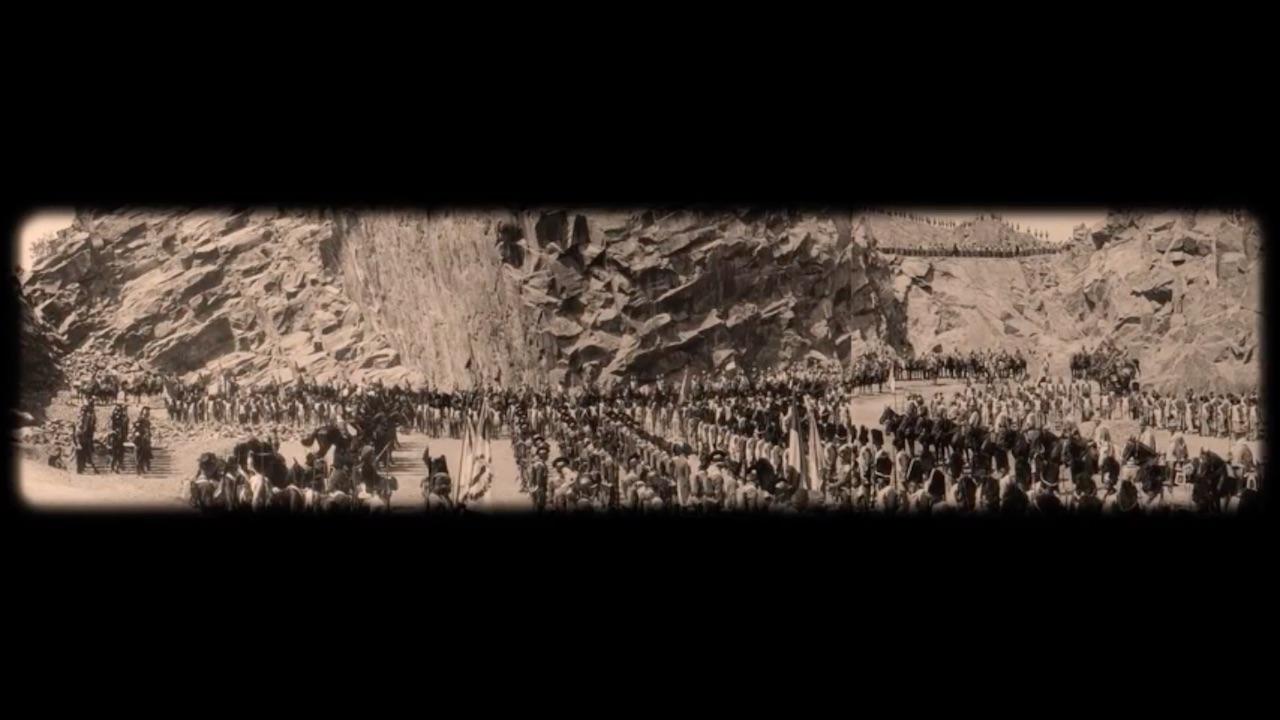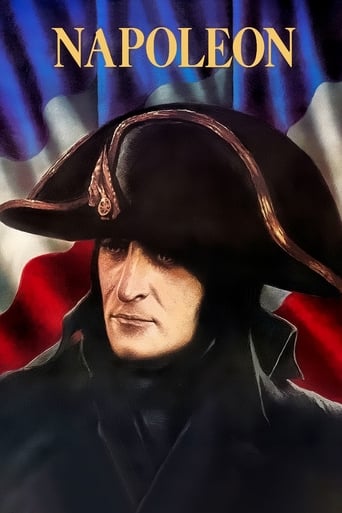



Tied for the best movie I have ever seen
Better Late Then Never
It's not great by any means, but it's a pretty good movie that didn't leave me filled with regret for investing time in it.
View MoreThis is one of the few movies I've ever seen where the whole audience broke into spontaneous, loud applause a third of the way in.
View MoreWhilst the on-going scandal rages on about the rights of ownership of this supposed Masterpiece and without a proper DVD release available, there seems to be few options.Firstly, I'd never seen either the film, nor extracts from it, even. It is often cited as the best film made at that point (1927) and is truly Napoleonic in scale and ambition, using cutting edge film techniques that only a few Russian directors employed - and a bit later at that.There's an imported (Korean/Chinese) DVD that apparently is heavily compressed in order to fit 3.5 hours all onto one disc and so, subsequently, quality is rubbish. Or so reviewers have said - in fact the legalities and the quality (or lack of) is all they seem to carp on about.Having not being able to find even a Korean DVD, I found a secondhand NTSC video on a well-known auction site, which comes in two cassettes, each being just under 2 hrs and housed in an outer case. My old JVC VHS recorder, long disconnected, just so happens to play the U.S format NTSC videos as well as VHS, and so, I thought my bidding, whilst a gamble, might be worth it, if my machine could play it.It does. The picture quality is OK, never exactly sharp in detail but with good contrast and not as muddy as many Silent era film DVDs. You just see slight magenta and green bands where the tinting of the film is sepia, but that is well controlled and easily gotten used to. The stereo realisation of Caarmine Coppolla's new score sounds surprisingly good and full-bodied, for a video.So, this 'solution' may not be favourable or even possible for many but my £15 winning bid was worthwhile, in a roundabout way! And, of course, I get to see the Masterpiece in about the best from currently available. Better that than not at all, surely?
View MoreI feel fortunate that tickets were available at the last minute and I was able to see the Kevin Brownlaw 5 1/2 hr restoration of Abel Gance's "Napoleon". The hype after the first weekend's performances made it irresistible. The film was accompanied by the Carl Davis score, conducted live by Mr. Davis, and played flawlessly, by the Oakland East Bay Symphony, at the beautiful Paramount Theater in Oakland, California. (Eat your hearts out Manhattan and Hollywood.) It felt a special occasion and the audience was primed for the event.I've wanted to see "Napoleon" for a very long time and somehow as I've gravitated toward DVD I hoped that I could watch it at home. Wait, wait, wait and nothing. Luckily, the DVD option never happened.When I heard that the San Francisco Silent Film Festival intended to show the Brownlaw restoration over two weekends in Oakland. I never thought that a regular film buff, like myself, would be able to get tickets. Fortunately I was able to do so.I traveled to Oakland, arrived an hour early for what was, in itself, with intermissions and a dinner break, an eight hour commitment. I've attended films with similar demands ("Our Hitler" comes to mind) and I only hoped it would be worth the commitment.At the dinner break, about half way through the film, while I was impressed with the production values and the seemingly modern shooting style what most impressed me was the live symphonic accompaniment. But, based on my own expectations, I was a bit disappointed in the film itself. But that feeling was soon dissipated by the beauty and the power of the last half of the film. The cinematography seemed even more modern (lots of hand-held shots and special effects), plus the frankness of the sexuality, the humor, the romanticism, and beautifully paced scenes of great sensitivity.By the time of the "Three Screens," wonderment, (Gance called it "Polyvision") I'd been won over, completely by this Masterpiece. There is no way to describe what Gance was able to produce. It must be witnessed first hand. One can only hope that somehow it will receive further exposure to those who love the greatest art form, Cinema. I'd see it again in a heartbeat.
View MoreNapoleon (1927) 1981 cut **** (out of 4) Abel Gance's technical marvel was certainly years ahead of its time but I'd guess that most people would find it a chore to sit through today. The film follows Napoleon as a child all the way up to mid-life where the film ends because the director had planned on making five more films in the series but could never get the backing. Storywise, there really isn't anything new here that we haven't seen in previous epics from Griffith or DeMille. What really separates this thing is its technical beauty, something that could be lost on those who don't know much about how films were back in the day. If anyone has a decent amount of knowledge about the silent era then this film will certainly knock their socks off. I would argue that the actual battle scenes were better in Intolerance and Ben-Hur but the scope here is certainly multiplied. The director was highly influenced by Griffith and even asked for his advice before going into this film and it's clear what Griffith told him, he took it to the next level. For starters, the first big battle takes place when Napoleon is a child and he and his friends are having a snowball fight. This might sound simple but the director makes a great battle of it. The next big moment happens when Napoleon is stuck on a small boat out at sea when a storm hits. The way this is edited together creates some great tension and even better are the various (at the time) strange camera movements that get you right into the storm. Another battle, taking place at night, during a rain storm, also looks wonderful. Not to mention the final battle scene where the director uses an early example of widescreen. This effect (three cameras side by side shooting) might not stand up to today's standards because it's easy to see where the "next screen" is but it still looks great.
View MoreFirstly, let me say that I believe Abel Gance's Napoleon to be without question the greatest film of all time. Unfortunately I have not seen the longer version but it is my earnest wish that it become available in the future on DVD. However, to echo the general acclaim previously noted in these user comments on the merits of this unique film is not my purpose today.Instead, I would like to comment specifically regarding remarks above by *HARRY-76* regarding Napoleon Bonaparte: "barbarian....sick and warped mind in need of therapy while being institutionalized" and also the comment of *JAYBABB*: "Napoleon was a madman". I really wonder how deeply both of these film reviewers have actually delved into the persona of Napoleon the man and his life -- if at all -- or perhaps they have made their referenced opinions based on the film alone? Or maybe they are erroneously relying on the long standing joke about insane people believing they were Napoleon Bonaparte? That is a popular one, but an unfortunate one. The very real accomplishments of this man are far too extensive for me to go into here. I will note one or two of the more far-reaching events however. The Code Napoleon of 1804, which covered all of Napoleonic France, much of which is not only still in effect in modern day France, but also from which a number of our own U.S. civil laws are based. The Code Napoleon, conceived for the guidance and protection of French citizens, covered areas such as: Civil Rights of Citizens, Rights and Duties of Married Persons, Divorce, Paternal Power, Acquiring Property, Donations and Wills. All this, remarkably, was not created by a statesman known as a man of peace but produced under the aegis of an unquestionably talented warrior, while at the same time he was quite busy consolidating his dominion over most of the European continent. I might add here that while we all acknowledge the militarism of Bonaparte, he certainly had plenty of company in an era beset by European military conflict, even discounting his presence on the world stage. A common error here is that his actions needs to be seen in the context of his times, not of our time. Although his career was cut short before achieving his goal, his prophetic vision of a United Europe without borders while all within would be equal, would seem to be identical with the powerful movement we see today toward European unity 200 years later.While there was no testing as such in the 18th Century, Napoleon is universally considered today to be among those notables in history who were geniuses; this man with a brilliant mind who could dictate to three secretaries all at the same time, on three totally different subjects.I do not wish to take up too much space here with a subject which -- while I nevertheless find interesting personally -- I yet have the knowledge that it is not directly related to filmdom and IMDb, so I will therefore close. However I have a final question which I direct to both *HARRY-76* and*JAYBABB*, which is this: Assuming your criticism of Napoleon is based on that which is more publicized, his military career, I would be greatly interested to know if you also consider such figures as Julius Caesar, Alexander the Great and even a couple of home-grown Americans, Douglas MacArthur and George Patton, to be "madmen.....who should have been institutionalized"?
View More